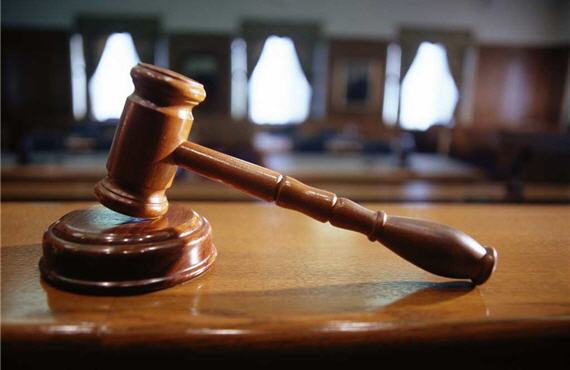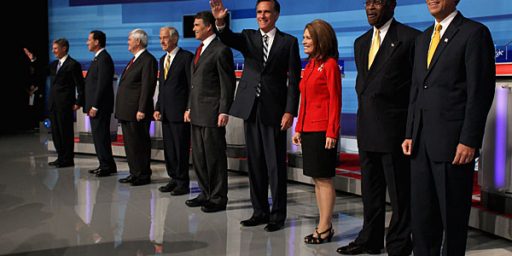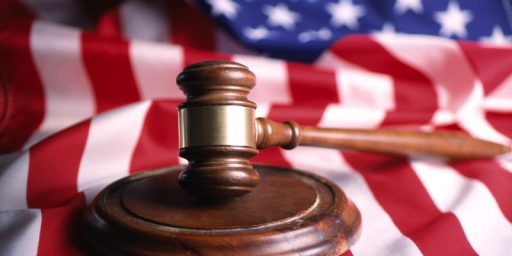Federal Appeals Court Rejects Perry, Gingrich Effort To Get On Virginia Ballot
Not surprisingly, a three judge panel of the 4th Circuit Court of Appeals has unanimously rejected Texas Governor Rick Perry’s effort to get on Virginia’s Primary ballot:
In a 22-page order, a three-judge panel of a federal appeals court today rejected Rick Perry’s appeal to appear on the Virginia ballot.
Perry initially challenged the state’s stringent ballot laws on Dec. 27, after he and Newt Gingrich failed to qualify with the required 10,000 signatures. Gingrich, Rick Santorum and Jon Huntsman all joined the suit.
U.S. district judge John Gibney ruled against the challenge last Friday, saying Perry and the other candidates had waited too long to file their suit. Perry and Gingrich both appealed the decision, but today’s ruling means their only path forward would be to appeal to the U.S. Supreme Court.
The appeals court confirmed the argument that Perry waited too long to challenge the law, and should have done so before he failed to qualify for the ballot.
“If we were to find Movant’s delay excusable, we would encourage candidates to wait until the last minute to bring constitutional challenges to state election laws,” the decision reads. “Once a candidate learned he had been denied a place on the ballot, he would take his disappointment to the courthouse and hapless state election boards would be forced to halt their scheduled election processes to wait for a ruling.”
The judges note that even long-shot candidates in the past have managed to meet the state’s signature requirements, meaning they are clearly feasible.
“Under this regulatory scheme, a wide array of candidates has managed to access the Virginia primary ballot,” their order says. “Although some of these candidates garnered a small percentage of the primary vote, they all were able to comply with Virginia’s 10,000 signature requirement as well as its residency requirement for petition circulators.”
The Appeals Court largely accepted the District Court’s laches analysis, and agreed that Perry and the other parties had failed to act with due diligence to protect their rights in a reasonable amount of time:
Amended in 2000, the circulator residency requirement has been in place for over a decade and has governed multiple presidential primaries. And plaintiffs’ own exhibits demonstrate that the Board adopted a document entitled “Deadlines, Duties and Ballot Access Requirements” on May 25, 2011, which stated that “[c]andidates wishing to participate in the presidential primary must follow the procedures outlined below,” including the “Petition Requirement[]” that they must “provide an affidavit signed under oath by the person who circulated it that . . . s/he is registered, or eligible to be registered, to vote in Virginia.” (emphasis in original). Virginia has done nothing to lead anyone astray with respect to this requirement. The residency requirement for petition circulators was unambiguous and available for all to see. Two candidates had no difficulty discerning or fulfilling these requirements, nor did multiple candidates in presidential primaries in the past. If Movant believed this provision violated the Constitution, he could and should have acted expeditiously
If we were to find Movant’s delay excusable, we would encourage candidates to wait until the last minute to bring constitutional challenges to state election laws. Once a candidate learned he had been denied a place on the ballot, he would take his disappointment to the courthouse and hapless state election boards would be forced to halt their scheduled election processes to wait for a ruling. Challenges that came immediately before or immediately after the preparation and printing of ballots would be particularly disruptive and costly for state governments. See Dobson v. Dunlap, 576 F. Supp. 2d 181, 187 (D. Me. 2008) (applying laches to bar a constitutionalchallenge to a state election law after noting that the state had “invested approximately 225 person hours in designing, preparing and proofing the paper ballots”). “[T]here must be a substantial regulation of elections if . . . some sort of order, rather than chaos, is to accompany the democratic processes,” Anderson v. Celebrezze, 460 U.S. 780, 788 (1983), and we are loath to reach a result that would only precipitate a more disorderly presidential nominating process.
What is more, by permitting candidates to wait until after the ballot has been set to bring their challenges, we would perforce leave to utter speculation the question of whether any legal foundation exists for the ultimate remedy of adding a candidate’s name to the ballot. The belated nature of Movant’s suit, for instance, makes it all the more difficult to determine with any confidence whether a particular injury is even traceable to the allegedly unconstitutional residency requirement. See Lujan v. Defenders of Wildlife, 504 U.S. 555, 590 (1992) (holding that in order to demonstrate standing, a plaintiff must allege that its injury is “fairly traceable to the defendant’s allegedly unlawful conduct”). Movant failed to submit petitions containing at least 10,000 signatures to the Board under section 24.2-545(B) of the Virginia Code, a requirement the district court noted would pass muster “even under the strict scrutiny standard.” While Movant of course predicts that he would have met the 10,000 signature threshold if only he had been allowed to use non Virginia residents to -gather signatures, such counterfactual speculation is not the office of the federal judiciary. We have no inkling as to whether Movant would have actually been able to secure 10,000 signatures, even if non-Virginia residents were able to circulate his petitions. Inviting delayed challenges like the one before us today would leave this court with only the most infirm evidentiary basis upon which to grant the relief requested.
As I said, this isn’t entirely surprising. Perry’s initial legal arguments were weak to begin with and the appeal was even weaker. I suppose they had to file it, though, just to show that they put up a fight. In any case, the only names on the Virginia ballot will be Ron Paul and Mitt Romney, although it’s looking more and more certain that the race will be over by then.
Here’s the opinion:







It’s sort of odd, when seen in the same frame as this decision, that the Florida Rep. primary ballot is filled with names of candidates who have withdrawn. I’m sure that some voters, not aware that these are no longer viable candidates, will end up voting for them anyway. That’s ‘chaotic’ in is own — but clearly different — way.
FWIW, it seems that Mr Santorum and Mr Perry might lose their place on the Illinois ballot. Apparently they didn’t collect enough signatures in every district altho their total signatures were sufficient. This governing stuff is really hard!
I love it! I’ve seen so many cases where a laches defense doesn’t work that it’s nice to see one where it does.
Doug, it already is over.
@John Burgess:
They never were viable, but that isn’t a handicap in GOP primaries.